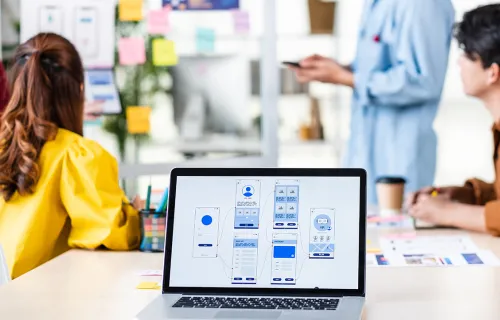Accelerating the move to online sales to drive forward the auto industry
My colleague Adam Kobeissi shared a post a few weeks back about how digital innovation has never felt more relevant. He highlighted the growing need to expand digital channels and increase intelligent process automation to provide a better platform for customer engagement and improve business agility.
Going back to the previous decade, I think if you asked automotive industry professionals what they expect the most significant innovation in car buying/finance to be in the next decade, I’m sure they would have cited a move away from dealerships to online sales. However, with dealerships now cautiously reopening after weeks of closure, this seems a uniquely apt moment to ask: Why hasn’t this industry seen this predicted surge in online sales? As a proportion of all retailing, online sales accounted for 19.6% in February and increased to 30.7% in April due to the impact of Covid-19. Yet car sales accounted for only a tiny proportion of that.
One theory I often hear is that people actually enjoy the dealership experience and want to see what they’re buying. However, research doesn’t support this this theory, particularly among younger consumers. A recent survey by Autotrader found that 86% of consumers under 24 want the car buying experience to improve, and a staggering 92% are unsure as to whether they can trust a retailer. An increasing number of people (27%) would also happily purchase a new car online without a test drive as a 2019 study by Peter Vardy found.
So what is going on here? Consumers want online auto sales, so why is it taking such a long time to gain traction? For used vehicles, online car sales has grown rapidly. Companies like Carwow and Buyacar allow customers to buy and finance a car from the comfort of their sofa with minimal dealer contact.
There are retailers that are offering a full online journey for new car purchasing and finance such as Tesla which, due to their digital sales channel, had the best-selling vehicle for April and May. There are also offerings such as Hyundai’s ‘Click to Buy’, Peugeot’s ‘Order Online’ and Smart. The majority of auto manufacturers do have a digital channel, but ultimately the online customer journey stalls and face-to-face interactions are required. Often the transaction requires a response from a finance company, which is only available within office hours, and therefore the process is unable to operate 24/7 effectively.
Many companies have yet to tackle how to value trade-in vehicles online, arrange test drives and delivery, or even digitally sign contracts. This makes a visit to the dealer the convenient solution. Also underwriting and verifying documentation are often points where asset finance companies still depend on human decision-making, despite the fact that the insurance and retail banking sectors have already embraced machine learning in these areas. These remain barriers to a 24/7 online sales model with a seamless customer experience.
So what is holding us back from fully automating the digital journey for the automotive industry? Is it that customers are too readily accepting the status quo, or is it the companies themselves being slow to leverage emerging technologies such as facial recognition, OCR and machine learning? The answer is probably a bit of both, but it’s worth remembering that sometimes consumer apathy over a new idea can lead us to think the status quo is never going to change. Contactless payments is a great example. The first commercial examples date back to the 1990s. For years it was on a slow burn, but now is ubiquitous. Those who long prophesied its dominance were right; it just took a while before it reached the ignition point and exploded from early adopters into the mainstream.
Disruption to the status quo is already underway. Amazon and Google have both been looking to move into selling and financing cars online. Amazon is already doing this in the U.S.,and in March 2020 there was an announcement of FCA (FIAT) partnering with Amazon to deliver cars by subscription. Amazon has also started introducing interest free credit options into their purchase process for larger purchases.
Now the universe has given the situation a little extra impetus in the shape of COVID-19. With social distancing in all reopened businesses and the potential for further lockdowns if the virus spikes again, daily life has changed radically for the foreseeable future. It seems highly likely that the normalisation of buying a car online is accelerating, even as I sit here in my home office and speculate about it. Being able to supply customers with vehicles and finance in a frictionless, speedy, contact-free way will soon be the new normal in our new normal world.
If you would like to discuss how CGI could help your business accelerate its digitalisation programmes, please contact me.






